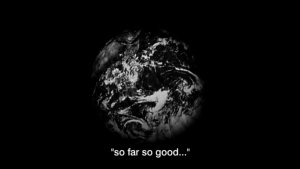This review may contain spoilers
"The one who was laughing at me... the one who thought I was embarrassing... was me after all."
Firstly, some thoughts from my initial viewing. "Shino-chan wa jibun no namae ga ienai" is a film that stings with how relatable it is; not just to those who've suffered speech impediments, but to all those who are insecure and lack a place in the world. The pain of rejection, casual cruelties, and frustration at oneself isn't soothed by tactless words of encouragement, nor is it truly defeated by the kindness and empathy of others. Shino runs and runs away, whether it is on her two feet or by fruitlessly attempting to circumvent her stuttering. Even when Kayo chases after her and Tsuyoshi attempts to make remands for his teasing, she deflects their understanding behaviours. Alone and having realised that Kayo's faith towards her has never wavered even as the latter was abandoned, Shino discovers the key to 'say[ing] her own name'- expressing herself to the world. Or rather, that the lock which prevented her inability to express herself didn't just exist within her mouth, but also her mind; through her own perceived inadequacy and dare I say, self-loathing. An idiom comes to mind; "You can lead a horse to water but you can't make him drink". Perhaps it should be reworded for this context; "You can give a student a stage to stand on but you can't coax the words out of her mouth."
Then, some pros and cons.
Pros
-Quite a lot is left to be inferred by the viewer; for example, why Shino avoids Tsuyoshi even after he amended for his crude behaviour AND she gave the green-light for him to join Shinokayo. Why Shino seems to suddenly demolish the progress she had made in the first half of the film and regresses into her antisocial shell once more. Why what appears to be a feel-good film has a slightly heartbreaking conclusion.
-Realistic characters; everyone presumably has at least one of them in their lives. The attention-seeking clown, the one who is sullen yet secretly kind, the well-meaning parent and teacher who are defeated by their lack of empathy, the one who is mocked and pushed down for a flaw that they were born with. Touchingly, the main trio are all connected by their insecurities and their desire to belong.
-Appropriately bittersweet (but ambiguous) ending. Adachi Shin didn't give viewers what they wanted; to see Shino and Kayo perform together again (possibly with Tsuyoshi on his tambourine). And sadly, that's how friendships often turn out. Ties that are severed won't repair at an instant, let alone at all. Kayo never got to see Shinokayo fully materialise, Tsuyoshi couldn't even be "that one guy in the back" and Shino never acknowledged his apology. Even though the perfect worlds that the three characters envisaged were unattainable (the three are alone in the end and Shino's stutter hasn't vanished), steps have been made in the right direction. That's life, isn't it?
-Deliberately imperfect but endearing musical scenes. Shino's off-key yet joyous singing voice and Kayo's inaccurate yet determined guitar strumming seemed to meld so well together. This odd sense of harmony seems to be a metaphor for the necessity of friendship to draw out one's potential.
-Very fine acting and chemistry. Despite their young ages, the performers pulled their weight to deliver moving, layered performances. Makita Aju in particular was just amazing.
Cons
-May be a pro for some, but the film winds up moping for longer than is comfortable or necessary.
-(Also a pro) but how stuff is left for the viewer to infer. I watched this to unwind and ended up feeling more agitated by the end. Sometimes you just want a film that explains everything clearly to you. This ain't it, chief.
-The happiness and sadness in this film seem to alternate until the bittersweet ending. They could've been blended more thoroughly throughout the entire film.
A moving and realistic film overall.
Then, some pros and cons.
Pros
-Quite a lot is left to be inferred by the viewer; for example, why Shino avoids Tsuyoshi even after he amended for his crude behaviour AND she gave the green-light for him to join Shinokayo. Why Shino seems to suddenly demolish the progress she had made in the first half of the film and regresses into her antisocial shell once more. Why what appears to be a feel-good film has a slightly heartbreaking conclusion.
-Realistic characters; everyone presumably has at least one of them in their lives. The attention-seeking clown, the one who is sullen yet secretly kind, the well-meaning parent and teacher who are defeated by their lack of empathy, the one who is mocked and pushed down for a flaw that they were born with. Touchingly, the main trio are all connected by their insecurities and their desire to belong.
-Appropriately bittersweet (but ambiguous) ending. Adachi Shin didn't give viewers what they wanted; to see Shino and Kayo perform together again (possibly with Tsuyoshi on his tambourine). And sadly, that's how friendships often turn out. Ties that are severed won't repair at an instant, let alone at all. Kayo never got to see Shinokayo fully materialise, Tsuyoshi couldn't even be "that one guy in the back" and Shino never acknowledged his apology. Even though the perfect worlds that the three characters envisaged were unattainable (the three are alone in the end and Shino's stutter hasn't vanished), steps have been made in the right direction. That's life, isn't it?
-Deliberately imperfect but endearing musical scenes. Shino's off-key yet joyous singing voice and Kayo's inaccurate yet determined guitar strumming seemed to meld so well together. This odd sense of harmony seems to be a metaphor for the necessity of friendship to draw out one's potential.
-Very fine acting and chemistry. Despite their young ages, the performers pulled their weight to deliver moving, layered performances. Makita Aju in particular was just amazing.
Cons
-May be a pro for some, but the film winds up moping for longer than is comfortable or necessary.
-(Also a pro) but how stuff is left for the viewer to infer. I watched this to unwind and ended up feeling more agitated by the end. Sometimes you just want a film that explains everything clearly to you. This ain't it, chief.
-The happiness and sadness in this film seem to alternate until the bittersweet ending. They could've been blended more thoroughly throughout the entire film.
A moving and realistic film overall.
Was this review helpful to you?
























